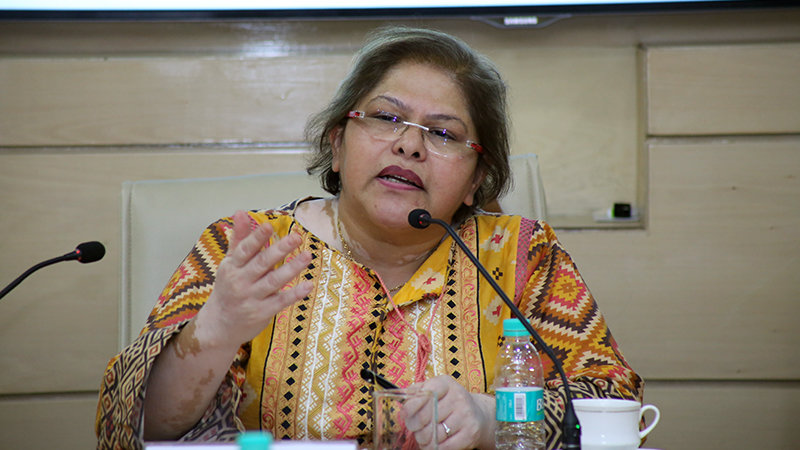'Imran Khan would stick to status-quo on Pakistan’s relations with India and Afghanistan'

TEHRAN - The elections in Pakistan this year have been marred by violence and allegations of large-scale irregularities, allegedly engineered by the military establishment.
Some major political parties have alleged that the powerful Pakistani military did not provide level-playing field to all the parties and favored Imran Khan’s Tehreek Insaaf Party (PTI), which eventually emerged as the largest single party with 115 seats, followed by Pakistan Muslim League (PML-N) with 64 seats and Pakistan People’s Party with 43 seats.
In this interview with Tehran Times, Ayesha Siddiqa, a Pakistani military scientist, political commentator and an author who serves as a research associate at the SOAS South Asia Institute, speaks about the allegations of vote rigging, challenges before the new government, the foreign policy issues, the conundrum of government formation in Punjab province, FATF grey list, and security challenges in the wake of the emergence of ISIS in Pakistan.
Siddiqa says the military establishment helped Imran Khan’s PTI in the election and adds that the economy will be the biggest challenge before his government. On the issue of foreign policy, especially relations with India and Afghanistan, she says Khan would stick to the status-quo which is the policy of the military establishment.
Following are the excerpts:
Q. Pakistan Tehreek Insaaf (PTI) emerged as the single largest party in Pakistan elections, but the outcome has been marred by allegations of irregularities. Did the military establishment favor PTI over other parties?
A: The election results are contested by major political parties. Their claim is that people were not provided form 45 which you are given after the counting ends. There was certainly rigging and according to European Union (EU) election observers, the 2018 elections were less fair than 2013.
Clearly, the military establishment helped PTI. Even before the elections, pressure was exerted on people to vote for PTI or join the party. Even a senior judge of the Islamabad High Court said that judges were being called by the ISI (Pakistan’s intelligence agency) to give decisions in a manner to block PML-N's path.
Q. Now Imran Khan is all set to become the new Prime Minister of Pakistan after a long political journey. What are the biggest challenges before his government?
A: The biggest challenge before Imran Khan is to form a government. He has simple majority and would need to get people on board to make a government. His right hand man Jahangir Tareen is busy getting members together, sometimes fairly and other times unfairly.
After he takes oath, the biggest challenge will be the economy. Pakistan desperately needs money to survive. The Americans have put pressure on the International Monetary Fund (IMF) not to give Pakistan a bail out. Then there are issues like an accountable and independent process of accountability that does not appear to be targeting the opponents.
Pakistan's institutions have broken down and weakened including the civil bureaucracy and the judiciary. He will have to cautiously proceed to rebuild different institutions. Radicalism is another of the major problems for which there seem to be little option considering that Imran Khan is also in conversation with diehard Deobandi groups like Sipha-e-Sahaba.
Q. As he hinted in his victory speech, do you think his foreign policy will be different from his predecessors, especially when it comes to relations with estranged neighbors Afghanistan and India?
A: Khan mentioned both India and Afghanistan but he would stick to the status-quo which is the policy of the military establishment. In any case, India is about to enter its election cycle which means there will be little traction on both sides to laugh a major peace initiative. Having said that, the fact that Imran khan has admirers and cricketer friends on the other side, a conversation could begin. However, both India and Pakistan are not sure about what would be acceptable to both.
Q. Is it true that the important policy decisions in Pakistan are taken in Rawalpindi (military headquarters) instead of Islamabad (political headquarters)?
A: After 2018, Rawalpindi has emerged stronger than Islamabad. A weak central government, which is what Imran Khan will have, will mean that there will be greater interference.
Q. Pakistan Muslim League (PML-N) was clearly overpowered by PTI across the country. With Nawaz Sharif behind the bars now and the morale of party workers down, will it be difficult for the party to make a comeback from here?
A: The PML-N has done better than PTI in Punjab. However, the problem is that with Nawaz Sharif in jail the current party leadership will not have the strength to fight back. The military is keen to see PTI make government in Punjab. In another four years, the influence will reduce. I see PML-N weakening over time.
Q. Pakistan was recently placed on the FATF 'grey' list for failing to curb anti-terror financing. What should the new government do to make sure the country is taken off the list?
A: The new government, if it is serious about FATF, should make sure that it implements laws to stop financing of terror organizations. The LeT or Jaishe Muhammad or Ahle Sunnat wal Jamaat (ASWJ) all are going about their business. There is money coming from somewhere. These activities are observed by the world. This has to stop.
Q. There have been some deadly attacks in Pakistan recently which were claimed by the ISIS. Do you think the terrorist group has gained firm foothold in Pakistan?
A: The ISIS and Al-Qaeda continue to exist in Pakistan and Afghanistan. Part of the problem is that their sister organizations that are based in Pakistan are still there. Unless there is a clamp down on all such organizations the problem will be there.
